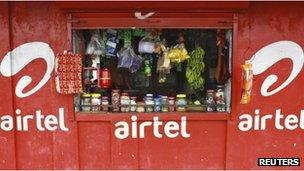How WPP and Bharti chiefs built their brands
- Published
Businesses may be formed in different ways, but their success is often determined by their leaders' drive and ability to spot an opportunity.
Indian entrepreneur Sunil Mittal and British businessman Sir Martin Sorrell are two men who have certainly spotted an opportunity or two between them.
Mr Mittal is the founder, chairman and group chief executive of the multi-billion dollar Bharti Enterprises group of companies. His empire spans everything from agriculture to retail, but the pinnacle of the group is Airtel - India's biggest mobile phone brand and the fifth largest in the world.
Sir Martin Sorrell is the chief executive of the advertising group, WPP. Having bought a stake in 1985 in Wire and Plastic Products, a British wire shopping basket manufacturer, the following year he took over as chief executive and began the creation of what is now the world's largest marketing services and advertising group.
He has ruthlessly mounted hostile takeovers of some of the world's largest advertising-related companies, including the $566m (£356m) takeover of JWT and the $825m (£519m) acquisition of Ogilvy & Mather.
But he is the first to admit that he has enjoyed his fair share of luck, no more so than with the acquisition of JWT.
"We looked at the balance sheet and we saw under the caption of freehold property a freehold property, which we actually thought was Berkeley Square in London," he says.
It turned out though that the property was in Tokyo, and far more valuable.
"[Our chief financial officer] said, 'Well they [the bank] have come back and they will lend us $100m against this,' so we instantly knew it was worth $200m, and we sold it for $207m about six months later in 1989," Sir Martin says.
The Bharti model, on the other hand, is to form partnerships with large international companies each time it enters a new business sector or a new market. For instance, it has partnerships with computer giant IBM, retailer Walmart and insurance house Axa.
"These companies look for big markets and India is a big market, it's a continent of consumers but they cannot get into these countries on their own," Mr Mittal says.
"They need a local person just like you need local people. I need capital, technology and want to jumpstart rather than working over 10 years to reach the point where I would be with them in a year's time."
Looking for products
The two men had very different starts to their careers.
Born in the Indian city of Ludhiana, Mr Mittal started his first business at the age of 18. The area where he grew up was renowned for its bicycle-making industry, and his first enterprise was supplying bicycle parts.

Prepaid Airtel minutes are widely available in India from street vendors
But, aware that there was finite growth in this industry, he began to look for other businesses opportunities and decided he wanted to do something that would meet a vital need in India, so he began importing portable power generators.
"I grew up through huge power shortages and I thought to myself, this little piece of equipment, the portable generator, could light up a few fans and bulbs in homes and that would be a great success," he says.
All went well for three years, until the Indian government decided to ban the import of generators. So Mr Mittal began looking for his next product, which led to him introducing the push-button phone to India and thus entering the telecoms industry.
But while Mr Mittal started his own business at the age of 18 straight out of university and admits his education "was more on the streets", Sir Martin took his time waiting for the right opportunity to come along.
After graduating from Cambridge University and Harvard Business School, he enjoyed a highly successful career with the British advertising agency Saatchi and Saatchi.
In his late 30s however, he decided to go it alone. He attributes this partly to the "male menopause" and partly to a desire to work for himself, an opportunity that his father, whom he regards as a key influence in his life, never had.
'Restless'
Despite their different backgrounds, the careers of both Sir Martin and Mr Mittal have been marked by the desire to expand. And neither man shows any sign of letting up.
Mr Mittal confesses to getting "restless" in recent years, and in 2010 he bought Zain, a mobile-phone company operating in 15 African countries, which proved to be a huge challenge.
"When we went in, we were quite clear that the company will be weak. But it was not weak - it was broken. And that kind of shocked us and we had to work two years to stabilise this ship," he says.
He adds that Africa is "on the rise" but you have to be patient and have a long-term view in order to succeed there.
Nor does Sir Martin have any plans to retire just yet. "Life has become more interesting, not less interesting," he says.
The Ideas Exchange is an eight-part series, starting on 1 September, broadcast on BBC World News on Saturdays at 02:30 and 15:30, and Sundays at 09:30 and 21:30 (all times GMT).
Every week, two international business leaders meet to talk about their different experiences of global markets and business.
- Published29 August 2012